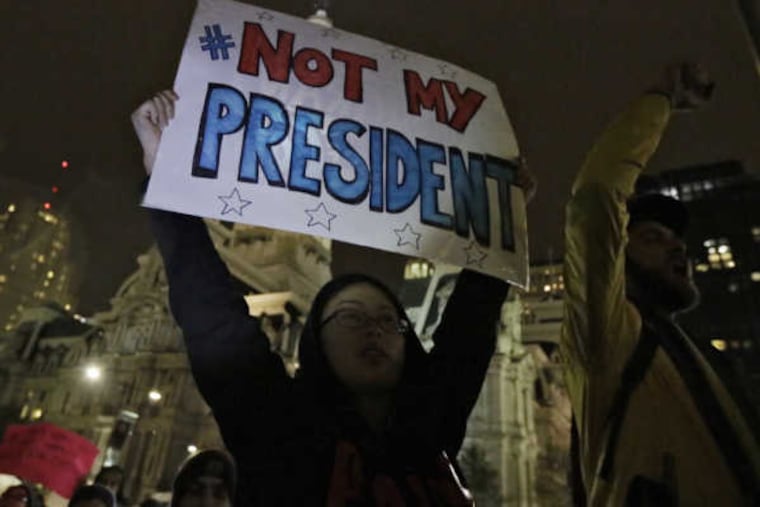Inquirer Editorial: There are other ways to bring about change besides protesting
Protests sprang up last week in Center City, on the Main Line, indeed across America, as the backlash to the election of Donald Trump as president continued.

Protests sprang up last week in Center City, on the Main Line, indeed across America, as the backlash to the election of Donald Trump as president continued.
Hundreds of thousands of protesters have taken to the streets. Many are angry and scared by Trump's derisive comments during the presidential campaign aimed at women, minorities, and the handicapped. But the protests have also morphed into broader grievances about police violence and the environment.
While most of the protests have been peaceful, some have turned ugly and violent. Protesters are free to let their voices be heard, but there is no room for violence. Demonstrators should keep in mind that there are more positive and effective ways to channel their voices.
The first stop would be the voting booth. About 43 percent of eligible voters did not cast ballots in this year's election. Anecdotal evidence indicates many of the protesters did not vote or voted for third-party candidates who had no chance of winning. Nonvoters who come out to protest are late to the debate.
Trump and his surrogates have done little to calm the anxiety that has led to the protests, and instead have called protesters paid professionals and jobless crybabies incited by the media. Others falsely claimed there was no backlash after Barack Obama was elected.
In fact, after Obama was elected in 2008 there were scores of hate-related incidents from California to Maine, including cross burnings, schoolchildren chanting "assassinate Obama," black effigies hung from nooses, and racial epithets scrawled on people's homes and cars.
The challenge going forward is for everyone to put aside his or her anger and work for real change. That doesn't mean you can't speak out. Quite the opposite: Fight to right wrongs. Stay informed and engaged. Support credible media outlets. Call out the spread of fake and bogus news on Facebook and other social media sites.
As citizens, support causes and individuals you believe in. Write to your local, state. and federal elected representatives to voice your support or opposition to proposals.
Better yet, get more involved in the political process. Most voters agreed the country deserved better candidates on the presidential ticket. Likewise, cities and states could use more qualified elected officials who truly represent the interests of voters.
To that end, the local civic group Young Involved Philadelphia has been working to increase civic engagement and empower young residents. Last week, the group held a workshop to teach millennials how to run for office.
Before the election, only 30 people were signed up for the program. But after the election, 275 showed up for the event. It was such a success that a second session is in the works for next month.
There has been much debate about the political divide between red states and blue states and cities and rural parts of the country. But more unites us than divides us.
Getting more involved, engaged, and informed is the best way to bring about real change in Washington, Harrisburg, and Philadelphia, or any other community that is begging for better leadership.